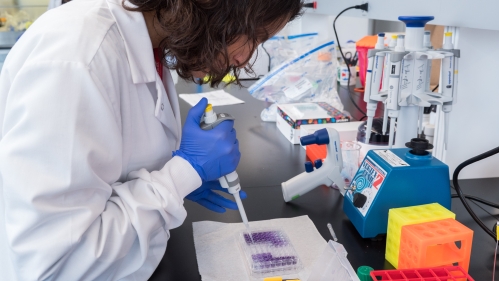
Chancellor’s Grant for Interdisciplinary Research Collaboration
Applications Are Closed
The objective of the Chancellor’s Grant for Interdisciplinary Research Collaboration is to promote interdisciplinary collaborations among faculty colleagues in different academic units across Rutgers University–Camden.
For questions or requests for late submission, please contact Vanessa Cubano at vanessa.cubano@rutgers.edu.
Summary:
The objective of the Chancellor’s Grant for Interdisciplinary Research Collaboration is to promote collaborations among faculty colleagues in different academic units across Rutgers University–Camden. This opportunity is for domestic and/or international interdisciplinary faculty collaboration. The outcome(s) from the collaboration must further advance Rutgers University–Camden’s research initiatives by incentivizing collaborative research that will lead to the development of a grant proposal, a publishable work, cross-listed course, or creative/artistic production.
Grant Amount: Up to $15,000
Grant Period: Semi-annual – Spring/Fall
Deadline:
Applications are due at or before 5 p.m. on January 5/June 30, 2024.
Criteria:
The Chancellor's Grant for Interdisciplinary Research Collaboration is intended to foster collaborations among faculty colleagues from various academic units at Rutgers University–Camden. To be eligible for this grant, applicants must meet the following criteria:
Eligibility:
Applicants must be current full-time faculty members at Rutgers University–Camden, representing different academic units or disciplines. Both domestic and international faculty members are eligible to apply.
Collaborative Proposal:
The application must include a well-defined interdisciplinary collaborative research proposal. The proposal should outline the research goals, objectives, methodologies, and expected outcomes. It should clearly demonstrate the collaborative nature of the project.
Alignment with Research Initiatives:
The proposed collaboration must align with and contribute to Rutgers University–Camden’s research initiatives. Applicants should explain how their collaboration will further the university's research goals and priorities.
Scholarly or Creative Outcomes:
The collaboration should lead to one or more of the following outcomes:
- Development of a grant proposal for external funding.
- A publishable work, such as a research paper, article, or book.
- Creation of a cross-listed course that integrates interdisciplinary perspectives.
- Production of a creative or artistic work that contributes to the arts and humanities.
Project Viability:
The proposed collaboration should be feasible within the allocated grant budget and timeline. Applicants should provide a clear project plan, including a budget that justifies the requested funding.
Commitment to Collaboration:
Applicants must demonstrate a genuine commitment to interdisciplinary collaboration. This includes a willingness to work closely with colleagues from different academic units and a dedication to contributing to a diverse intellectual environment.
Letter of Support:
Each applicant must secure a letter of support from their respective department chair or unit head, indicating their endorsement of the collaborative project and the faculty members' involvement.
Impact and Dissemination:
Applicants should describe how the project's outcomes will be disseminated, shared, or applied to benefit the broader academic community or the public.
Budget Transparency:
The application should include a detailed budget that clearly outlines how the grant funds will be utilized for the collaborative research project.
Reporting and Accountability:
Grant recipients are expected to submit a final report on the outcomes and impact of their collaborative research. This report should demonstrate how the project met the intended goals and contributed to the advancement of research initiatives at Rutgers University–Camden. Reports should also include a reflection on the value added from the support of the 15 in 5 initiative funding.
The Chancellor's Grant for Interdisciplinary Research Collaboration encourages faculty members to engage in meaningful interdisciplinary work that aligns with the university's research objectives and produces tangible outcomes. Applicants who meet these criteria will be considered for this valuable opportunity.
Application Process:
To ensure a smooth and efficient application process for the Chancellor’s Grant for Interdisciplinary Research Collaboration, the following steps should be implemented to support faculty members in their pursuit of interdisciplinary projects:
Step 1: Application Form
Faculty members can access the application form on the website under Chancellor’s Initiatives.
Step 2: Collaborative Proposal Submission
Applicants are required to submit a collaborative research proposal that outlines the objectives, methodologies, expected outcomes, and project plan.
Step 3: Alignment with Research Initiatives
Applicants should provide a narrative explaining how their collaboration aligns with Rutgers University–Camden’s research initiatives.
Step 4: Outcomes Plan and Budget
The application form includes sections where applicants describe the expected scholarly or creative outcomes of the collaboration, such as grant proposals, publications, courses, or artistic productions. A budget section allows faculty members to justify their funding requests.
Step 5: Letters of Support
Applicants must secure letters of support from their department chairs or unit heads, which can be uploaded within the application form.
Step 6: Review and Selection
A selection committee reviews the applications based on the eligibility criteria and the quality of the proposals. Applicants are informed of the timeline for the review process.
Step 7: Award Notification
Applicants selected for the grant receive an official award notification via email. The notification includes details about the grant, the expectations for the collaborative project, and the disbursement of funds.
Step 8: Project Implementation and Reporting
They are expected to submit a final report after project completion, outlining the outcomes and impact of the interdisciplinary collaboration.